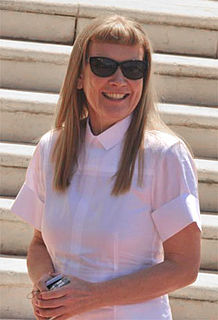A Quote by Paul Auster
Autobiographical writings, essays, interviews, various other things... All the non-fiction prose I wanted to keep, that was the idea behind this collected volume, which came out about few years ago. I didn't think of Winter Journal, for example, as an autobiography, or a memoir. What it is is a literary work, composed of autobiographical fragments, but trying to attain, I hope, the effect of music.
Quote Topics
Related Quotes
I say at the very end of "Winter Journal" that I do dream about my father often. I think I have a tremendous compassion for him, which has grown over the years. A certain kind of pity for him also in that he was so unrealised as a human being, so dogged, and so shut-off from people in many ways. You know, I've been writing another book, and it's another non-fiction autobiographical work, kind of a compliment to "Winter Journal", and it's just finished.
My children haven't read 'Winter Journal'. They have read some of my work, but I really don't foist it on them. I want them to be free to discover it in their own good time. I think reading an intimate memoir by your father - or an intimate autobiographical work, whatever we want to call this thing - you have to come at it at the right moment, so I'm certainly not foisting it upon them.
It always seems to people that I'm avoiding saying, 'It's autobiographical,' but I really do believe that human beings make stories and they make themselves. If I told you the same story twelve years ago, I could have emphasized something different. The importance changes, the meaning of things shifts over time. Also, I think all art is autobiographical. Every endeavor is full of impressions of ourselves.
I wrote a book called ‘Dancing The Dream’. It was more autobiographical than Moonwalk, which I did with Mrs. Onassis. It wasn’t full of gossip and scandal and all that trash that people write, so I don’t think people paid much attention to it, but it came from my heart. It was essays, thoughts and things that I’ve thought about while on tour
I have very rarely written autobiographical stuff. "Greasy Lake" and some other works have some autobiographical elements, as does "Birnam Wood," the one I chose to end [this collection] with. I lived in that house and some of my feelings are expressed in it, but it's not autobiography. It was not me and that didn't happen exactly that way.
I'm often a little perplexed, when I read a review of a book, by the quotes that are pulled out as evidence of excellent prose. I don't think great novels are necessarily composed of great prose, or that there's a correlation between beautiful prose and the quality of a work of fiction. A really good, interesting novel will often let a little ugliness get into its words - to create a certain effect, to leave the reader with a certain sense of disorientation.































